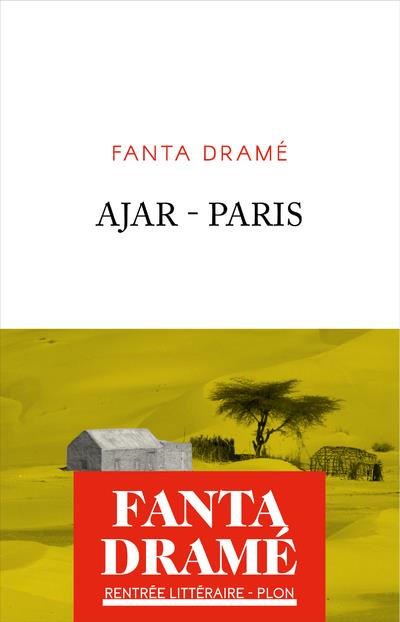
Ajar-Paris (Plon, 2022) Fanta Dramé
Préface – Faïza Guène
« Je vais écrire ta vie, papa (…) Je vais raconter ta vie dans un livre. »
Ajar-Paris est si bien construit et rempli de détails saisissants que je n’ai pu m’empêcher de l’imaginer déjà comme un film. Donc –
Scène 1 : intérieur jour, collège. La narratrice, Fanta Dramé, reçoit un coup de téléphone au collège de banlieue parisienne où elle travaille comme professeur de français. Scène 2 : intérieur, jour, hôpital. La famille autour du lit où gît la grand-mère mourante. Scène 3 : Fanta se rend pour la première fois en Mauritanie à Ajar, le village natal de son père et lieu de sépulture de la défunte. Scène 4 : de retour à Paris, Fanta décide d’écrire le parcours d’émigration de celui qui lui avait « transmis, malgré lui, la passion des livres » : son père. Ainsi commence cette histoire dans l’histoire.
Ajar-Paris est un livre qu’on pourrait qualifier de ‘roman vrai’, puisqu’il s’agit d’une fille qui raconte – avec amour et affection – l’histoire de son père. Ainsi ce roman siégerait-il aux côtés de Combats et métamorphoses d’une femme, l’autofiction d’Édouard Louis,et du roman autobiographique de Violaine Huisman, Fugitive parce que reine.
Ajar-Paris est surtout une histoire intime, riche de moments forts – dont : l’arrivée à Marseille du père quand il cherche de l’aide pour connaître la route vers la gare ; la scène du bureau de vote où la mère de la narratrice répond à une assesseuse paternaliste ; et, vers la fin, l’interaction à la préfecture.
J’attends avec impatience la sortie mondiale au cinéma d’une adaptation d’Ajar-Paris.
‘I am going to write about your life, Dad (…) I am going to tell the story of your life in a book.’
Ajar-Paris is so well structured and full of vivid detail that I couldn’t help already seeing it as a film. So –
Scene 1: interior, day, school. The narrator, Fanta Dramé, receives a phone call at the Parisian middle school where she teaches French. Scene 2 : interior, day, hospital. The family around the bed where the dying grandmother lies. Scene 3: Fanta goes for the first time to Mauritania – to Ajar, a village where her father was born and where her grandmother’s grave will be. Scene 4: back in Paris, Fanta decides to write the emigrant’s journey of the person who ‘unwittingly, passed on to her his love of books’ : her father. So begins this story within a story.
Ajar-Paris could be described as a ‘roman vrai’ (a true-story novel), as it is a daughter writing – with love and affection – about her father. So, this novel would sit alongside Édouard Louis’ autofiction about his mother, A Woman’s Battles and Transformations (Harvill Secker, 2022, translation by Tash Aw), and Violaine Huisman’s autobiographical novel about her mother, The Book of Mother (Virago Press, translation by Leslie Camhi).
Ajar-Paris is above all a personal story that is full of powerful moments – including : the father’s arrival in Marseilles when he is looking for help to find his way to the station; the scene at the voting station when the narrator’s mother replies to a patronising comment from polling officer; and, nearing the end, the exchange at the government offices.
I am so looking forward to a film adaptation of Ajar-Paris that will, I hope, be released at cinemas across the world.
Ps en musique
Fanta Dramé a mis en épigraphe d’Ajar-Paris quelques vers de la chanson « Les émigrants » (1987) de Charles Aznavour :
Comment crois-tu qu’ils ont tenu?
Ils ont tenu, en étant croyants et têtus
Déterminés pour leurs enfants
À faire un monde différent.